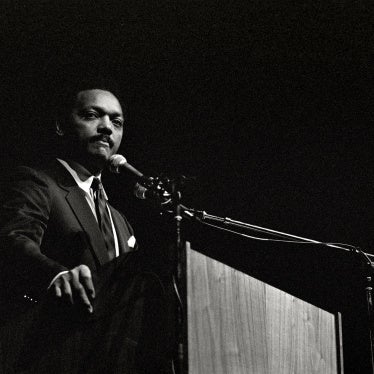The Bush administration should press Colombian president-elect Álvaro Uribe Vélez for concrete actions against paramilitary groups when he visits Washington this week, Human Rights Watch said today. During his first official visit to Washington as president-elect, Uribe is expected to meet President Bush and cabinet officials, including Defense Secretary Donald Rumsfeld.
Colombia is the third highest recipient of U.S. military aid, after Israel and Egypt, and is expected to receive at least $ 378 million in FY 2002 alone. This month, both houses of the U.S. Congress voted to remove restrictions that aid be used only for counterdrug operations, allowing U.S. trained and equipped troops to take part in counterterrorist operations.
The Colombian military is seeking U.S. assistance in its fight against guerrilla forces, chiefly the Revolutionary Armed Forces of Colombia (FARC). The FARC commits serious human rights and humanitarian law abuses, among them massacres, targeted killings, kidnaping, and indiscriminate attacks with gas cylinder bombs.
At the same time, the Colombian military has maintained links with and failed to effectively confront paramilitary organizations that were responsible last year for dozens of massacres of Colombian civilians. On September 10, 2001, Secretary of State Colin Powell placed the main paramilitary group in Colombia on the list of Foreign Terrorist Organizations.
"Uribe must demonstrate to the world that he will attack all sources of terror in Colombia, including paramilitaries that continue to have the active support of Colombia's military," said Jose Miguel Vivanco, the executive director of the Americas Division of Human Rights Watch. "If he weakens the guerrillas at the expense of strengthening the paramilitaries, Colombian democracy will continue to be as embattled as it is today."
Since 1997, all U.S. military aid has been conditioned on Colombia's progress in meeting human rights conditions, among them breaking persistent links to paramilitary groups. The U.S. Senate took another step in its latest package, designating funds for the first-ever anti-paramilitary brigade to support efforts to pursue and arrest paramilitary leaders. There is continuing concern about Uribe's commitment to combating paramilitaries. As governor of Antioquia, one of Colombia's most violent states, Uribe recruited hundreds of civilians to work as spies and extra fighters in army-led operations, a program sponsored by the central government that he developed aggressively.
Human Rights Watch found that these groups, called "Convivirs," were poorly supervised and regulated, and several were formed by known paramilitaries leaders or became criminal gangs. Among them was a "Convivir" in La Ceja, Antioquia, that was linked by government authorities to a series of killings in 1996 and 1997, when Uribe was governor.
During his campaign, Uribe kept as a close adviser Gen. (ret.) Rito Alejo del Río, who was fired in 1999 by President Andrés Pastrana for his alleged support of paramilitary groups while in command of the Seventeenth Brigade in Antioquia between 1995 and 1997, when he worked closely with Governor Uribe. That year, the United States canceled Del Río's visa to the United States because of his alleged involvement in acts of terrorism and drug trafficking.
Uribe and his current nominee for the combined ministries of Interior and Justice, Fernando Londoño, were the only featured speakers at a dinner that honored Del Río and another fired general as Colombian heroes.








